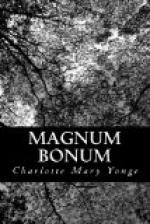“Oh, I longed never to have come,” said Elvira; “and then I began to get homesick, but they would not let me come!”
No doubt Lisette had feared the revival of the Brownlow influence if her charge were once in England, for she had raised every obstacle to a return. Poor Gould and his niece had both looked forward to Elvira’s coming of age as necessarily bringing them to England, but her uncle’s health had suffered from the dissipation he had found his only resource. Liquor had become his consolation in the life to which he was condemned, and in the hotel life of America was only too easily attainable.
His death deprived Elvira of the last barrier to the attempts of an unscrupulous woman, who was determined not to let her escape. Elvira’s longing to return home made her spread her toils closer. She kept her moving from one fashionable resort to another, still attended by Gilbert, who was beginning to grow impatient to secure his prize.
“How I hated it,” said Elvira. “I knew she was false and cruel by that time, but it was just like being in a trap between them. I loathed them more and more, but I couldn’t get away.”
Nurtured as she had been, she was helpless and ignorant about the commonest affairs of life, and the sight of American independence never inspired her with the idea of breaking the bondage in which she was spellbound. Still, she shrank back with instinctive horror from every advance of Gilbert’s, and at last, to pique her, Lisette brought forward the intelligence that Allen Brownlow was married.
The effect must have surprised them, for Elvira turned on her aunt in one of those fits of passion which sometimes seized her, accused her vehemently of having poisoned the happiness of her life, and taken her from the only man she could ever love. She said and threatened all sorts of desperate things; and then the poor child, exhausted by her own violence, collapsed, and let herself be cowed and terrified in her turn by her aunt’s vulgar sneers and cold determination.
Yet still she held out against the marriage. “I told them it would be wicked,” she said. “And when I went to Church, all the Psalms and everything said it would be wicked. Then Lisette said it was wicked to love a married man, and I said I didn’t know, I couldn’t help it, but it would be more wicked to vow I would love a man whom I hated, and should hate more every day of my life. Then they said I might have a civil marriage, and not vow anything at all, and I told them that would seem to me no better than not being married at all. Oh! I was very very miserable!”
“Had you no one to consult or help you, my poor child ?”




